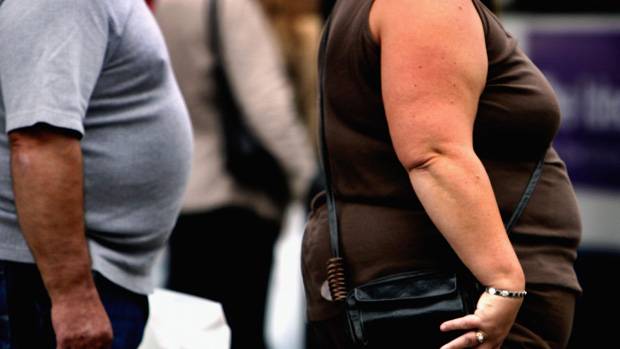The 'super-obese' under-25s having gastric band surgery
Surgeons say cost of obesity crisis could bankrupt the NHS – but operations can save money

A free daily email with the biggest news stories of the day – and the best features from TheWeek.com
You are now subscribed
Your newsletter sign-up was successful
Nearly 40 per cent of under-25s who have weight-loss surgery are classified as "super-obese", a new report has shown. The authors say it is a "reflection on society's failings" that many young people are so overweight.
One leading surgeon in the field said obesity threatens to bankrupt the NHS because of the high cost of treating diseases associated with being overweight, especially type 2 diabetes, the BBC says, but surgery can save money.
Richard Welbourn, who also chairs the National Bariatric Surgery Registry, which produced the report, said: "Severe and complex obesity is a lifelong condition associated with many major medical conditions, the cost of which threatens to bankrupt the NHS.
The Week
Escape your echo chamber. Get the facts behind the news, plus analysis from multiple perspectives.

Sign up for The Week's Free Newsletters
From our morning news briefing to a weekly Good News Newsletter, get the best of The Week delivered directly to your inbox.
From our morning news briefing to a weekly Good News Newsletter, get the best of The Week delivered directly to your inbox.
"For severely obese people, medical therapy, lifestyle changes and attempts at dieting rarely succeed in maintaining long-term, clinically beneficial weight loss due to the hormonal effects of being obese.
"Our data shows that there is great benefit from bariatric surgery for all the diseases studied. In particular, the effect on diabetes has important implications for the NHS."
The new report looked at 18,283 bariatric operations done between 2010 and 2013, including gastric bands and gastric bypasses. The average patient was nearly twice the weight they should be for their height, with a body mass index of 48.8.
More than 70 per cent of those patients could not climb three flights of stairs without resting, classified as "functional impairment", says The Guardian. Five hundred and fifty patients were under 25 and another 62 were under 18.
A free daily email with the biggest news stories of the day – and the best features from TheWeek.com
The surgeons say there is good news: after treatment, more than half of patients were no longer functionally impaired and could climb three flights of stairs without a rest.
On average, one year after surgery, patients had lost 60 per cent of their excess weight, while a majority of those who had had type 2 diabetes no longer had the symptoms.
-
 The Olympic timekeepers keeping the Games on track
The Olympic timekeepers keeping the Games on trackUnder the Radar Swiss watchmaking giant Omega has been at the finish line of every Olympic Games for nearly 100 years
-
 Will increasing tensions with Iran boil over into war?
Will increasing tensions with Iran boil over into war?Today’s Big Question President Donald Trump has recently been threatening the country
-
 Corruption: The spy sheikh and the president
Corruption: The spy sheikh and the presidentFeature Trump is at the center of another scandal
-
 Captain Tom charity closes to donations amid daughter’s pool row
Captain Tom charity closes to donations amid daughter’s pool rowSpeed Read Hannah Ingram-Moore to appeal council order to demolish spa complex at her home
-
 The Week Unwrapped: Sex and health, the Earth’s core and another new year
The Week Unwrapped: Sex and health, the Earth’s core and another new yearpodcast Is the NHS failing British women? What’s going on at the centre of our planet? And what’s in a date?
-
 Tirzepatide and the other ‘breakthrough’ obesity drugs
Tirzepatide and the other ‘breakthrough’ obesity drugsfeature Huge demand for weight-loss medication means prices have soared
-
 National nursing strike: should the patient ‘always come first’?
National nursing strike: should the patient ‘always come first’?Talking Point Recent YouGov poll found that 65% of public approves of strike action
-
 The science behind lab-grown blood
The science behind lab-grown bloodfeature Development of ‘absolute game changer’ could help those with sickle cell and other conditions
-
 The Week Unwrapped: Russian visas, Arab fattism and quiet quitting
The Week Unwrapped: Russian visas, Arab fattism and quiet quittingpodcast Is Finland an unwilling backdoor to Europe? Has fat-shaming reached the Middle East? And are young workers really slacking off?
-
 ‘Moving CBBC online isn’t modernisation – it’s dangerous’
‘Moving CBBC online isn’t modernisation – it’s dangerous’Instant Opinion Your digest of analysis from the British and international press
-
 The Week Unwrapped: Quitting China, social age checks and dental deserts
The Week Unwrapped: Quitting China, social age checks and dental desertspodcast Why has AirBnB given up on China? Are social networks finally taking age limits seriously? And why is it so hard to find a dentist?